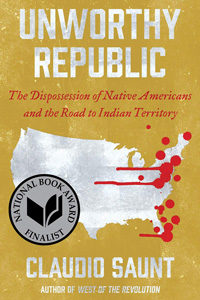 Claudio Saunt, Unworthy Republic; The Dispossession of Native Americans and the Road to Indian Territory (New York: W.W. Norton, 2020), 396pp.
Claudio Saunt, Unworthy Republic; The Dispossession of Native Americans and the Road to Indian Territory (New York: W.W. Norton, 2020), 396pp.
When Andrew Jackson was inaugurated as president on March 4, 1829, he promised that "it will be my sincere and constant desire to observe toward the Indian tribes within our limits a just and liberal policy, and to give that humane and considerate attention to their rights and their wants which is consistent with the habits of our Government and the feelings of our people." Nine months later, in his first message to Congress in December 1829, he called for the "voluntary" emigration of 80,000 Native Americans to lands west of the Mississippi River. Jackson's signature policy of "Indian Removal," as its proponents called it, would "define his presidency," says Claudio Saunt, in his meticulous account of one of the most shameful episodes in American history.
Indian emigration was not voluntary by any stretch of the imagination, nor was it humanitarian. Rather, it was a state-sponsored mass deportation of "unimaginable violence." It was a land grab by wealthy planters. It was a time of broken treaties and cynical promises, forced marches, racial subjugation in the name of white supremacy, a type of ethnic cleansing, and perhaps a form of genocide. People died from disease (cholera, measles, malaria), exposure, starvation, and "exterminatory warfare." Having stolen Indian lands, the planter-politicians then maximized their profits through "all the woes and horrors" of black slave labor. As the 1830's unfolded, so-called emigration morphed into expulsion, and expulsion into extermination. The "Indian Question," as Saunt shows, was America's counterpart to Europe's "Jewish Question."
In his introduction, Saunt explains that he wants to make three points in his book. First, this expulsion and extermination of indigenous Americans was unprecedented. Second, the removal was a turning point for the indigenous tribes and their relationship with the nation. And perhaps most importantly, Saunt argues that the catastrophe was not inevitable, contrary to what its supporters argued, that the Indians were too barbaric, avaricious, or primitive to survive on their own, and that they needed to be "civilized." And so in 1841, John Quincy Adams described this decade-long tragedy in his diary as a "sickening mass of putrefaction… It is among the heinous sins of this nation, for which I believe God will one day bring them to judgment."
Unworthy Republic won a 2020 National Book Award.
Dan Clendenin: dan@journeywithjesus.net


